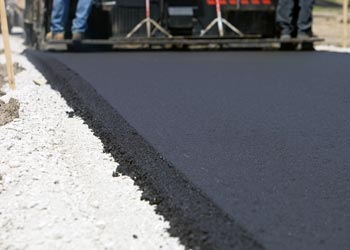Exploring the Environmental Advantages of Hot Mix Asphalt
The use of Warm Mix Asphalt in facilities tasks provides an engaging situation for lasting growth and environmental stewardship. By diving into the complex details of its manufacturing processes and the innovative use of recycled products, a deeper understanding arises of how this technology surpasses plain surface area applications. The ecological benefits of Warm Mix Asphalt expand far past preliminary impacts, providing a nuanced perspective on just how this product can lead the way for a greener future.

Decreased Greenhouse Gas Emissions
The manufacturing procedure of Warm Mix Asphalt involves heating up the mixture of aggregate and asphalt binder to high temperature levels. By including recovered asphalt sidewalk and recycled asphalt tiles into the mix, the need for virgin materials is lowered, leading to power financial savings and reduced discharges linked with extraction and handling.
Researches have actually revealed that Hot Mix Asphalt pavements have a smaller carbon impact over their life cycle compared to other pavement alternatives. The toughness and recyclability of Hot Mix Asphalt better boost its environmental benefits by minimizing the need for regular maintenance or replacement, thereby conserving resources and decreasing exhausts connected with reconstruction tasks.
Power Effectiveness and Preservation
The production process of Hot Mix Asphalt not just minimizes greenhouse gas exhausts however likewise contributes considerably to energy performance and conservation initiatives. Energy efficiency is a crucial advantage of Hot Mix Asphalt production contrasted to various other pavement kinds. The durability of Warm Mix Asphalt reduces the frequency of maintenance and repair, leading to long-term power financial savings.
Sustainable Pavement Solutions

One key aspect of sustainable pavement solutions is making use of recycled materials such as recovered asphalt pavement (RAP) and recycled asphalt tiles (RAS) By including these materials right into the asphalt blends, the need for virgin resources is lowered, bring about lower power consumption and greenhouse gas discharges during manufacturing. In addition, the reuse of these materials helps divert waste from garbage dumps, contributing to an extra circular and lasting economic climate.
Moreover, lasting sidewalk services concentrate on optimizing pavement design to boost performance and durability. Techniques such as cozy mix asphalt (WMA) and rock mastic asphalt (SMA) improve the resilience and durability of pavements, lowering the demand for frequent repair work and replacements. By executing these cutting-edge techniques, infrastructure designers can produce pavements that not only satisfy high-performance criteria yet additionally minimize their ecological footprint.
Minimized Environmental Influence
With a concentrate on sustainability and eco-conscious methods, sidewalk services are designed to reduce the ecological effect of building and upkeep processes. Hot mix asphalt, particularly, provides several advantages that contribute to decreasing the overall environmental footprint of road facilities. One vital facet is the recyclability of asphalt, which can be recycled numerous times without endangering its quality. index This characteristic helps in preserving natural resources and reducing the quantity of waste sent to land fills.
Moreover, the manufacturing of warm mix asphalt discharges lower levels of greenhouse gases contrasted to other pavement products, making it a much more eco-friendly option. The energy efficiency of asphalt plants has also boosted throughout the years, leading to decreased fuel usage and reduced exhausts. Furthermore, the smooth surface area of hot mix asphalt decreases rolling resistance for vehicles, resulting in reduced fuel intake and decreased air contamination from vehicle discharges.
Contribution to Climate Adjustment Reduction
Hot mix asphalt plays a crucial role in mitigating environment modification via its sustainable buildings and lowered environmental influence. One considerable contribution to climate change reduction comes from the power efficiency of hot mix asphalt manufacturing. Compared to other sidewalk options, the manufacturing process for warm mix asphalt consumes less power and emits reduced degrees of greenhouse gases, thus decreasing its overall carbon footprint.
Additionally, warm mix asphalt's ability to reflect sunlight, referred to as albedo, aids in decreasing city warm island results. By minimizing warmth absorption and retention, hot mix asphalt pavements can lower the need for a/c in metropolitan areas, as a result lowering greenhouse gas exhausts connected with energy consumption for cooling objectives.
In addition, the sturdiness and recyclability of hot mix asphalt even more improve its climate adjustment mitigation capabilities. Regrading. The long life-span of asphalt pavements minimizes the need for regular repair work or replacements, ultimately lowering the carbon exhausts linked to road maintenance activities. Moreover, the recyclability of asphalt products minimizes the demand for virgin sources and lowers the environmental influence of sidewalk construction, straightening with sustainable methods for environment adjustment reduction.
Conclusion
In conclusion, the ecological benefits of Hot Mix Asphalt demonstrate its significant contribution to lowering greenhouse gas exhausts, saving energy, and reducing ecological influence. This sustainable pavement solution lines up with Visit This Link environment modification mitigation initiatives, promotes source preservation, and improves framework growth. By utilizing recycled products, energy-efficient manufacturing procedures, and durable style, Hot Mix Asphalt plays an important duty in fostering an extra ecologically friendly approach to infrastructure building and construction.
The production procedure of Warm Mix Asphalt involves warming the combination of accumulation and asphalt binder to high temperatures. By integrating recovered asphalt sidewalk and recycled asphalt tiles into the mix, the need for virgin products is reduced, leading to power savings and reduced discharges connected with extraction and handling.
One trick aspect of lasting pavement remedies my explanation is the use of recycled materials such as redeemed asphalt pavement (RAP) and recycled asphalt roof shingles (RAS) Methods such as cozy mix asphalt (WMA) and rock mastic asphalt (SMA) boost the durability and strength of sidewalks, lowering the demand for constant repair work and replacements. Compared to other pavement alternatives, the production process for warm mix asphalt eats less power and discharges reduced degrees of greenhouse gases, therefore reducing its overall carbon impact.